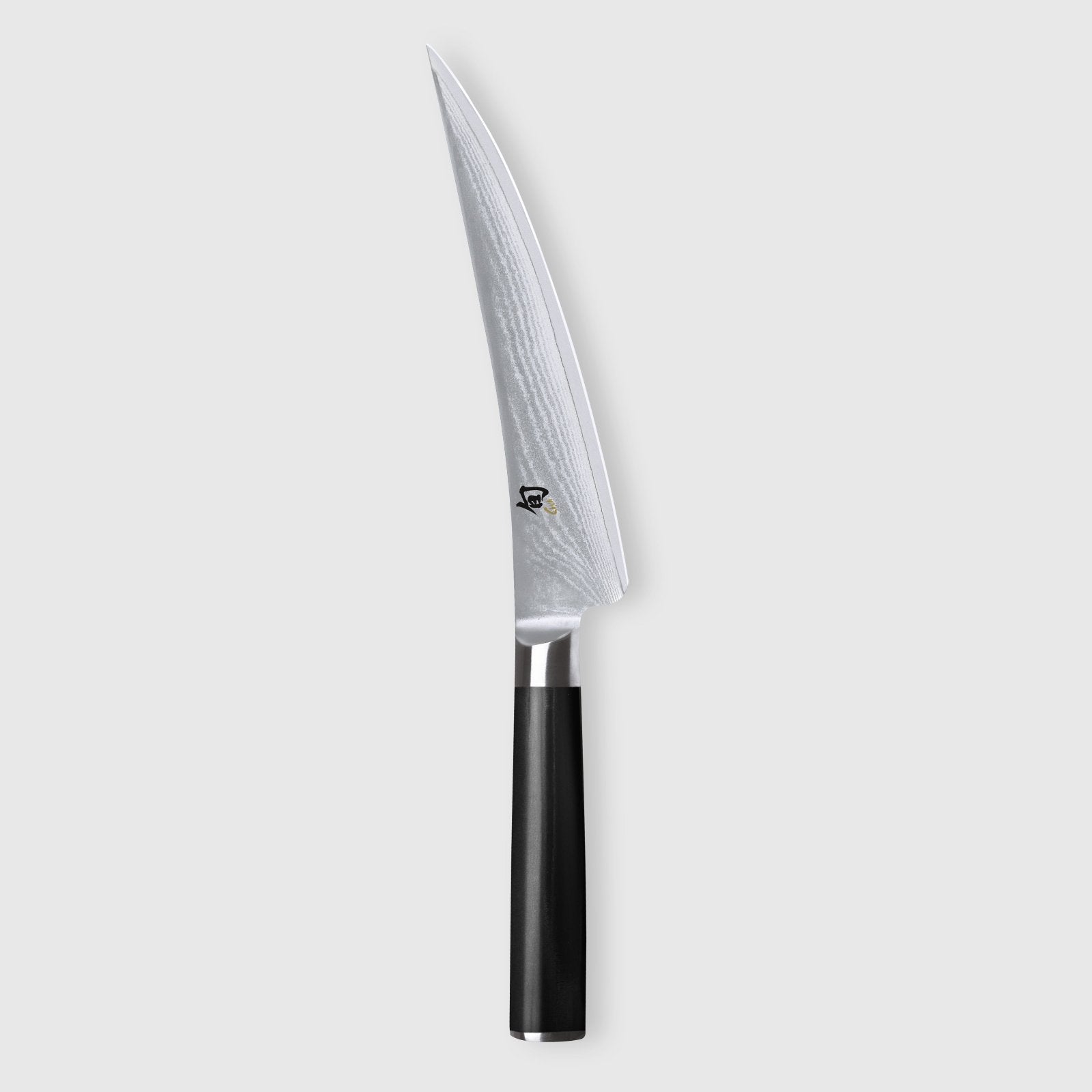
Japanese Knives
We offer a curated selection of exquisite Japanese knives from some of the most esteemed brands in the industry, including Shun, Miyabi, KAI, Global, and More. Renowned for their exceptional craftsmanship, Japanese knives are a staple in any kitchen, celebrated for their razor-sharp edges, lightweight design, and unparalleled precision. These knives are meticulously forged from high-quality steels, such as VG-10, ensuring they maintain their edge longer and deliver outstanding performance with every slice. Our collection features a variety of Japanese knife styles, from the versatile Gyuto to the specialised Nakiri and Santoku, each designed to elevate your cooking experience.
Investing in a Japanese knife means embracing a tool that combines beauty and functionality, built to withstand the rigors of daily use while enhancing your culinary skills. Whether you're a seasoned chef or an enthusiastic home cook, the Japanese knives that we choose to stock are designed to inspire confidence and creativity in the kitchen, making every meal preparation a pleasure.
Key Features
- Renowned Brands:Featuring top names like: Global, Kai, Tamahagane, Miyabi, and more.
- Express Delivery: If ordered before 2 pm we will dispatch it the same working day. Express delivery is available at the checkout.
- UK Support Talk to us, not a robot, we can advise and process your order over the phone
FAQs
Japanese knives are renowned worldwide for their exceptional craftsmanship, sharpness, and specialised design, making them unique compared to other types of kitchen knives. Here are some key features that set Japanese knives apart:
1. Blade Material and Hardness
Various high-quality steels are used in making Japanese knives, each offering unique benefits. For instance, VG-10 is a popular Japanese stainless steel known for its edge retention and sharpness. Other types of steel like SG-2 and R2/SG2 are praised for their durability and ease of sharpening. Japanese knives are also often harder than that used in Western knives, usually ranging between 58 to 65 on the Rockwell Hardness Scale.
2. Sharpness and Edge Geometry
The edge of a Japanese knife is typically ground to a much sharper angle than Western knives, often between 10 to 15 degrees per side, compared to 20 to 22 degrees for Western knives. This sharper edge allows for precise, clean cuts, making Japanese knives ideal for tasks requiring accuracy and delicacy, such as slicing raw fish for sushi or finely chopping vegetables.
3. Single-Bevel and Double-Bevel Blades
Many traditional Japanese knives feature a single-bevel blade, meaning the knife is sharpened on only one side. This creates a razor-sharp edge perfect for fine, precise cuts but requires more skill to use and maintain. Double-bevel blades, sharpened on both sides, are also common in Japanese knives and offer a balance of sharpness and ease of use.
4. Specialised Japanese Knife Types
Japanese knives are often highly specialised, with different knives designed for specific tasks. For example, the Yanagiba is designed for slicing raw fish, the Deba is for cutting through fish and meat bones, and the Nakiri is for chopping vegetables. Having specific knives for specific culinary tasks gives an insight into the Japanese approach to cooking, where precision and technique are highly valued.
5. Artistry and Craftsmanship
Many Japanese knives are still handcrafted and use traditional techniques passed down through generations of skilled artisans. The craftsmanship often includes intricate handle designs and forging techniques, such as the Damascus pattern, where multiple layers of steel are folded together, resulting in a beautiful, wavy appearance on the blade.
.
Most Japanese knives are made in specific regions of Japan, known for their rich history of knife-making and metalworking. The two most prominent areas where Japanese knives are traditionally made are Seki City in Gifu Prefecture and Sakai City in Osaka Prefecture.
The Santoku knife is considered the most popular and versatile knife in Japan. Its name, "Santoku," translates to "three virtues" or "three uses," referring to its ability to effectively perform three fundamental kitchen tasks: slicing, dicing, and chopping. This versatility makes the Santoku knife a staple in Japanese kitchens and increasingly popular worldwide.
You can shop our Santoku knives here
Maintaining your knives involves several essential practices to ensure they stay sharp, durable, and in top condition:
- Cleaning: Always wash your knives by hand with warm water and mild detergent immediately after use. It's important to avoid using the dishwasher, as the harsh environment can damage both the blade and the handle over time. After washing, dry the knives completely with a soft cloth to prevent any rust formation.
- Honing: Regular honing is key to keeping your knives sharp and maintaining their edge. Use a honing steel before or after each use to realign the blade's edge. Hold the steel vertically and gently slide the knife down and across the steel at a 20-degree angle.
- Sharpening: In addition to regular honing, your knives will need periodic sharpening, typically once or twice a year depending on how frequently you use them. You can sharpen your knives using a whetstone, a handheld sharpener, or opt for professional sharpening services.
- Storage: Proper storage is crucial for the longevity of your knives. Store your knives in a knife block, on a magnetic strip, or within protective sheaths. This not only prevents the blades from dulling but also helps avoid accidents. Storing knives in a drawer is not recommended, as they can easily get damaged.
- Cutting Surface: To maintain the sharpness of your knife edges, always use wooden or plastic cutting boards. Cutting on hard surfaces like glass, metal, or stone can quickly dull your knives.
- Avoid Misuse: Remember that these knives are specifically designed for cutting food. Avoid using them for any non-food related tasks, as this can damage the blade.
- Handle with Care: Always be mindful of the knife's balance and handle it with care. Avoid dropping or carelessly tossing your knives, as this can lead to damage to both the blade and the handle.
Gyuto (Chef’s Knife)
- Purpose: The Gyuto is Japan's equivalent of the Western chef’s knife, designed as a versatile, all-purpose tool.
- Features: Typically lighter and thinner than Western chef’s knives, the Gyuto has a double-bevel edge and a sharper, more acute cutting angle. It excels at slicing, dicing, and chopping a variety of ingredients, including meat, fish, and vegetables.
- Why It’s Unique: The Gyuto’s lightweight design allows for precise, controlled cuts, making it popular among professional and home chefs alike. Its thinner blade also makes it more agile, allowing for smoother cuts and less fatigue during extended preparation.
2. Santoku (Multi-Purpose Knife)
- Purpose: Santoku, meaning “three virtues” in Japanese, refers to its ability to handle slicing, dicing, and chopping with ease.
- Features: The Santoku has a slightly shorter and wider blade than the Gyuto, with a distinctive rounded tip. Most santoku's feature the granton edge, which is when the knife has smalll indentations along the blade. This creates air pockets that reduce friction and prevent food from sticking. This feature is particularly useful when slicing thin cuts of vegetables, fruits, and proteins, ensuring smooth, clean cuts without tearing or bruising delicate ingredients.
- Why It’s Unique: With its flatter blade profile, the Santoku is ideal for quick, precise cuts on vegetables and meats, allowing for smooth, consistent chopping without needing a rocking motion. It’s often favoured by home cooks for its versatility and ease of use in smaller kitchens.
3. Nakiri (Vegetable Knife)
- Purpose: Nakiri knives are specialised for vegetable prep, particularly for tasks requiring delicate, consistent cuts.
- Features: The Nakiri has a flat, rectangular blade with a double-bevel edge, making it highly effective for cutting through vegetables without rocking. The flat edge ensures full contact with the chopping board, allowing for even, straight cuts.
- Why It’s Unique: This knife is perfect for creating thin slices, julienne, and dicing vegetables with precision. Its shape makes it easy to control, ideal for cooks who want uniform cuts without the need for a heavy knife.
4. Deba (Fish Butchering Knife)
- Purpose: The Deba is designed for butchering fish, cutting through bones, and filleting.
- Features: This knife has a thick, heavy blade with a single bevel, perfectly designed to cut through fish bones without damaging the delicate flesh.
- Why It’s Unique: Unlike Western boning knives, the Deba’s design allows it to tackle fish bones without compromising precision, providing clean cuts that maintain the integrity of the fish. It’s also versatile enough to handle small poultry bones and light butchering tasks.
Not all Japanese knives are single bevel, but many traditional styles are. Single-bevel knives are sharpened only on one side of the blade, creating an incredibly sharp edge ideal for precision tasks. This design helps reduce friction and prevents food from sticking to the blade, making single-bevel knives perfect for delicate tasks like slicing sashimi or filleting fish.
Shop at Cotswold Knife Company with confidence, knowing we are a verified stockist of all the knives we stock.


